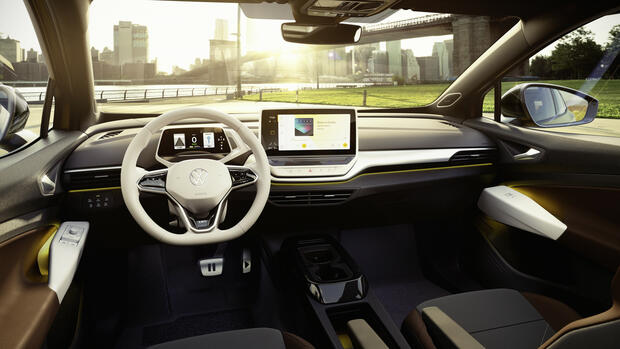The largest German car manufacturer has long overslept infotainment as a reason to buy.
(Photo: Volkswagen AG)
Dusseldorf Google or not? That was the big question recently when it came to Volkswagen’s cooperation in the infotainment sector. And indeed, Germany’s largest carmaker could open up a new app store for the American tech group.
In the Google discussion, however, one market has always been left out: China. The services of the search engine group are blocked there. Many other western apps also only run to a limited extent in the country. For car manufacturers, this means they have to look for other partners.
VW has now found one. On Thursday, VW’s software unit Cariad announced the establishment of a joint venture with the Chinese software provider Thundersoft. The Chinese side holds the majority with 51 percent, Cariad has a 49 percent stake in the joint venture. The merger still has to be approved by the authorities.
VW is investing tens of millions in infotainment in China
Thundersoft is known in China for its operating system technologies in the mobile, IoT and automotive sectors. In the joint venture with VW, the focus will be on developing and testing software for the areas of connectivity and infotainment. Software for the operating systems of the cars, for human-machine interactions in the cockpit and for cloud applications will also be written. The applications are to be integrated into VW’s existing infotainment system.
From corporate circles it is said that VW is investing a mid-double-digit million amount in the cooperation. Further partnerships would not be ruled out in this area, it is said. In infotainment, Huawei, Tencent and Alibaba are among the most important players in China.
VW wants to achieve more speed in infotainment through a new cooperation.
(Photo: Cariad)
The partnership with Thundersoft is an important step in accelerating the digital transformation at VW in China and “developing more tailor-made innovations in China for China,” explained Ralf Brandstätter, who is responsible for business in the Asian country at VW. VW had already taken a first step in this direction in October, when the Germans announced a two-billion-euro cooperation with the Chinese AI specialist Horizon Robotics in the field of autonomous driving.
Even if the current Thundersoft investment for VW dimensions is significantly lower, the infotainment area is extremely important in China – and an area that German car manufacturers have neglected for a long time. Because unlike in Germany, entertainment apps in the vehicle, from film streaming to karaoke machines, are a key purchase criterion for Chinese consumers.
As early as autumn 2021, the management consultancy Oliver Wyman found in a survey that 80 percent of vehicle owners in China would be willing to change car brands if they received better digital services. In Europe, only 40 percent of drivers would be willing to take this step.
VW absolutely needs to catch up with its electric cars in China. The Wolfsburg-based company still mainly sells combustion engines in the Far East, but with a downward trend. The core brand VW in China was able to double the delivery numbers of its all-electric ID cars in 2022 to around 140,000.
>> Read also: VW and Mercedes let Google and Apple deeper into the car
At the same time, the US carmaker Tesla sold more than three times as many cars in China. The Chinese brand BYD even sold 790,000 pure electric cars in its home market. This is shown by figures from the analysis provider Marklines.
VW CEO Blume has board members fly to Shanghai for a management conference
At the Shanghai Auto Show, the largest motor show in the world, VW boss Oliver Blume has therefore appointed the entire board for the coming week. For Germany’s largest car manufacturer, the market is about a lot, if not to say existence. Volkswagen sells almost 40 percent of its annual production in China. However, Tesla and the Chinese e-car manufacturers are significantly more advanced than the competition from Germany when it comes to digitization.
Because the markets are so different – and because the regulations in authoritarian China stipulate it – it has long been a premise under VW China Board Member Brandstätter to increasingly develop vehicles in China for China. This also applies to digital features. The software unit Cariad alone has doubled its number of employees in China to around 900 within the past twelve months.
In January, Brandstätter said to journalists in Berlin: Anyone who doesn’t offer cars in China in two or three years that largely drive themselves on the autobahn “will probably no longer be able to sell vehicles”.
For the infotainment area, software boss Dirk Hilgenberg emphasizes that the new joint venture is a commitment to “provide scalable, innovative solutions for infotainment and connectivity in China more quickly”. Time is ticking for VW.
More: Why the electric offensive by BMW, VW and Mercedes in China is faltering


